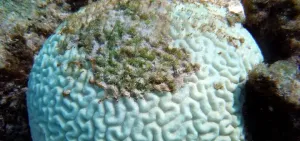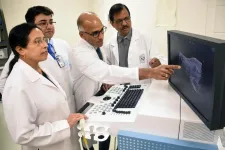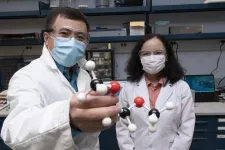Marine heatwaves becoming more intense, more frequent
Thinning surface layer of ocean leaves waters more susceptible to extreme warming events
2021-01-28
(Press-News.org) When thick, the surface layer of the ocean acts as a buffer to extreme marine heating--but a new study from the University of Colorado Boulder shows this "mixed layer" is becoming shallower each year. The thinner it becomes, the easier it is to warm. The new work could explain recent extreme marine heatwaves, and point at a future of more frequent and destructive ocean warming events as global temperatures continue to climb.
"Marine heatwaves will be more intense and happen more often in the future," said Dillon Amaya, a CIRES Visiting Fellow and lead author on the study out this week in the Bulletin of the American Meteorological Society's Explaining Extreme Events. "And we are now understanding the mechanics of why. When the mixed layer is thin, it takes less heat to warm the ocean more."
The mixed layer--the water in which temperature remains consistent--blankets the top 20-200 meters of the ocean. Its thickness is responsible for heat events: the thicker it is, the more the layer can act as a buffer to shield the waters below from incoming hot air. But as this armor thins, the mixed layer becomes more susceptible to rapid swings in temperature.
"Think of the mixed layer as boiling a pot of water," said Amaya. "It will take no time at all for an inch of water to come to a boil, but much longer for a pot filled to the brim to heat through."
Amaya and his team used a combination of ocean observations and models to estimate the depth of the mixed layer back to 1980, and also project out into the future. They determined that over the last 40 years, the layer has thinned by nearly 3 meters (9 feet) in some regions of the North Pacific. And by 2100, the mixed layer will be 4 meters (12 feet) thinner--30 percent less than what it is today. This thin mixed layer combined with warmer global temperatures will set the stage for drastic swings in ocean temperatures, leading to much more frequent and extreme heating events, the researchers say.
And it's already happening. Take the 2019 heatwave in the Northeast Pacific. Weakened winds and higher air temperatures came together to warm Pacific Ocean waters by about 3 degrees C (5.5 F). A thinning mixed layer most likely contributed to this surge of warm waters, the authors found. And it will get worse.
"If you take the same wind and ocean conditions that occurred in 2019 and you apply them to the estimated mixed layer in 2100, you get a marine heatwave that is 6.5 degrees C (12 F) warmer than what we say in 2019," said Amaya. "An event like that would absolutely devastate sensitive marine ecosystems along the U.S. west coast."
Amaya also points out that, as climate continues to warm and the mixed layer continues to thin, scientists might start to lose the ability to predict year-to-year ocean surface temperatures. Without the ability to accurately forecast ocean temperatures, fisheries and other coastal operations could be in danger.
Other studies also suggest marine heatwaves will become more common in the future, but not many have explored the root cause: ocean dynamics and physics. "In order to simulate these events in models and help predict them, we must understand the physics of why that's happening," said Amaya.
INFORMATION:
[Attachments] See images for this press release:

ELSE PRESS RELEASES FROM THIS DATE:
2021-01-28
Counties with a greater number of cannabis dispensary storefronts experience reduced numbers of opioid-related deaths relative to other locales, a recent University of California, Davis, study has found. This is the first study to examine the association between active cannabis dispensary operations -- both medical and recreational -- and opioid-related mortality rates at the county level, suggesting that providing alternative pain management could improve public health outcomes, researchers said.
"While the associations documented cannot be assumed to be causal, they suggest a potential relationship between increased prevalence of medical and recreational cannabis dispensaries and reduced opioid-related ...
2021-01-28
WASHINGTON --- Pancreatic cancer, one of the most lethal of all cancers, is capable of evading attacks by immune cells by changing its microenvironment so that the immune cells suppress, rather than support, an attack on the tumor. The scientists also found that that some of the mediators of this suppressive response, including a protein called STAT1, represent potential therapeutic targets that could be used to reverse this evasion and point to possible treatment opportunities.
The finding appears January 28, 2021, in Cancer Immunology Research.
"This ...
2021-01-28
The origin of flowering plants famously puzzled Charles Darwin, who described their sudden appearance in the fossil record from relatively recent geological times as an "abominable mystery". This mystery has further deepened with an inexplicable discrepancy between the relatively recent fossil record and a much older time of origin of flowering plants estimated using genome data.
Now a team of scientists from Switzerland, Sweden, the UK, and China may have solved the puzzle. Their results show flowering plants indeed originated in the Jurassic or earlier, that is millions of years earlier than their oldest undisputed fossil evidence, according to a new study published in the scientific journal Nature Ecology & Evolution. The lack of older ...
2021-01-28
Although loggerhead sea turtles return to the same beach where they hatched to lay their eggs, a new study by a USF professor finds individual females lay numerous clutches of eggs in locations miles apart from each other to increase the chance that some of their offspring will survive.
A study published in the journal "Scientific Reports" found that some females lay as many as six clutches as far as six miles apart during the same breeding season.
"Nesting females don't lay all their eggs in one basket. Their reproductive strategy is like investing in a mutual fund. Females divide their resources among many stocks rather than investing everything in a single stock," said Deby Cassill, biology professor ...
2021-01-28
Researchers with the Kansas City Veterans Affairs Medical Center and North Dakota State University have designed a new way to deliver pancreatic cancer drugs that could make fighting the disease much easier. Encapsulating cancer drugs in nanoparticles shows potential to target tumors more effectively and avoid danger to other parts of the body.
The study results appeared in the Jan. 4, 2021, issue of the journal Molecular Pharmaceutics.
Study author Dr. Sushanta Banerjee, a researcher with the Kansas City VA and University of Kansas medical centers, explains that this technology has the potential to drastically improve Veterans' cancer care. "Veteran health care will benefit immensely from such therapeutic models, as they are ...
2021-01-28
UPTON, NY--A team of researchers led by chemists at the U.S. Department of Energy's (DOE) Brookhaven National Laboratory has identified new details of the reaction mechanism that takes place in batteries with lithium metal anodes. The findings, published today in Nature Nanotechnology, are a major step towards developing smaller, lighter, and less expensive batteries for electric vehicles.
Recreating lithium metal anodes
Conventional lithium-ion batteries can be found in a variety of electronics, from smartphones to electric vehicles. While lithium-ion batteries have enabled the widespread use of many technologies, they still face challenges in powering electric vehicles over ...
2021-01-28
URBANA, Ill. - Getting nutrition right during a dairy cow's dry period can make a big difference to her health and the health of her calf. But it's also a key contributor to her milk yield after calving. New research from the University of Illinois shows diets containing consistent energy levels and the rumen-boosting supplement monensin may be ideal during the dry period.
"Many producers use a 'steam up' approach where you gradually increase the energy intake during the dry period to help adjust the rumen and adapt the cow to greater feed intakes after calving. Our work has shown that's really of questionable benefit for many farms, and it may be safer to just ...
2021-01-28
Global circulating winds can carry bacteria, fungal spores, viruses and pollen over long distances and across national borders, but the United States is ill-prepared to confront future disease outbreaks or food-supply threats caused by airborne organisms, says a new paper published in the Ecological Society of America's journal Ecological Applications.
Claire Williams, the paper's primary author and a research professor at American University, has spent decades studying long-range transport of tree pollen. Her early findings led to collaborations with German and Russian scientists who conducted a wide range of research - on forest genetics, atmospheric chemistry and ...
2021-01-28
Maybe space is tight in your home and you share a remote office with your spouse.
Or your partner asks you to step away from work to watch the children because they have an important call to jump on. Then you may wonder, 'Well, what makes his/her job more important than mine!'
There have been no shortage of conflicts arising from the era of COVID-19, and that includes the challenges at home between married couples.
In fact, the more a person felt that their spouse disrupted their daily routine, the more they viewed their relationship as turbulent, according to West Virginia University research.
Kevin Knoster, a third-year ...
2021-01-28
Washington and Chicago, January 28, 2021--The American Educational Research Association (AERA) and the Spencer Foundation have released a report, Voices from the Field: The Impact of COVID-19 on Early Career Scholars and Doctoral Students, that shares findings from focus groups conducted in spring 2020. The report, available on the AERA and Spencer websites, is part of an ongoing initiative by the two organizations to assess the pressing needs facing scholars and doctoral students during the pandemic and ways to address these needs.
"The realities of the COVID-19 pandemic and the ensuing impact on social institutions like school, work, and the family have created challenging ...
LAST 30 PRESS RELEASES:
[Press-News.org] Marine heatwaves becoming more intense, more frequent
Thinning surface layer of ocean leaves waters more susceptible to extreme warming events



